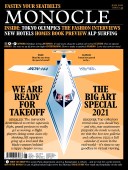
Issue 144
Our jubilant June issue is an artful thing indeed. Not least for its dedicated survey on the best auctions, gallery openings, studios and collectors sculpting the creative scene. We also eye up Iraq’s unlikely tourism play, profile the folks behind Japan’s will-they-won’t-they Olympics and get a first look at LVMH’s stunning makeover of an iconic Parisian department store. There’s also a transport theme speeding through the issue, from our exploration of the future of flight and choice insights on supersonic travel and e-planes to the urban infrastructure improvements we’re betting on and insights into the fast-escalating business of lifts. Not to mention recommendations, recipes and fresh reporting aplenty.
In This Issue
Oops! No content was found.
Looks like we no longer have content for the page you're on. Perhaps try a search?
Return Home

